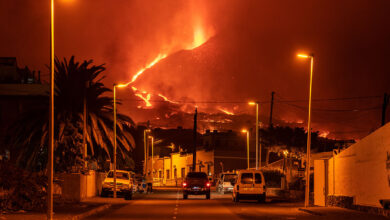The leak revealed by the government lobby to change a key report on climate change before COP26

A large document leak seen by the BBC shows how some countries are trying to change a fundamental scientific report on how to tackle climate change.
The leak reveals that Saudi Arabia, Japan, Australia, Argentina and Brazil are among the countries calling on the UN to minimize the need to quickly stop using fossil fuels.
It also shows that some rich nations are questioning paying more to andpoorer states to help them adopt the use of cleaner energy technologies.
These lobbying efforts raise questions for the COP26 climate summit, scheduled to take place in Glasgow in November.
The leak shows that countries differ from the UN recommendations, just days before they are asked to make significant commitments to curb climate change and keep global warming at 1.5 degrees.
The leaked documents consist of more than 32,000 Written presentations made by governments, companies and other stakeholders to the team of scientists compiling the UN report designed to gather the best scientific evidence on how to tackle climate change.
These “assessment reports” are produced every six to seven years by the Intergovernmental Panel on Climate Change (IPCC), the UN body charged with assessing the science of climate change.
Governments will use the report to decide what actions are needed to address climate change and it will be a crucial document for the negotiations at the Glasgow conference.
The authority of these reports derives in part from the fact that virtually every government in the world is involved in the process of producing them and reaching consensus.
The government comments read by the BBC are overwhelmingly oriented in a constructive sense and with a view to improving the quality of the final report.
The batch of comments and the latest draft of the report were handed over to Greenpeace UK’s team of investigative journalists, Unearthed, who provided them to BBC News.
Fossil fuels
The leak shows that several countries and organizations argue that the world doesn’t need to cut fossil fuel use so fast as recommended by the current draft of the report.
An adviser to the Saudi Arabian Oil Ministry demands that “phrases like ‘the need for urgent and accelerated mitigation actions at all scales…’ should be removed from the report.”
A senior government official from Australia rejects conclusion that coal-fired power plants need to be shut down, despite the fact that ending the use of coal is one of the stated goals of the COP26 conference.

Saudi Arabia is one of the world’s largest oil producers and Australia is the main exporter of coal.
A senior scientist at India’s Central Fuel and Mining Research Institute, which has strong ties to the Indian government, cautions that coal is likely to remain the mainstay of energy production for decades because of what they describe as the “tremendous challenges” of affordable electricity supply.
India It is already the world’s second largest consumer of coal.
Several countries argue in favor of emerging technologies – which are currently expensive – designed to capture and store carbon dioxide permanently underground.
Saudi Arabia, China, Australia and Japan, all major producers or users of fossil fuels, as well as the Organization of the Petroleum Exporting Countries (OPEC), support carbon capture and storage (CCS).
It is claimed that these CCS technologies could dramatically reduce fossil fuel emissions from power plants and some industrial sectors.
Saudi Arabia, the world’s largest oil exporter, asks UN scientists to delete their conclusion that “the focus of decarbonization efforts in the energy systems sector must be on rapidly shifting to zero-carbon sources and in actively eliminating fossil fuels ”.
Argentina, Norway and OPEC also disagree with the statement. Norway argues that UN scientists should consider CCS as a potential tool to reduce fossil fuel emissions.

The draft report accepts that the CAC could play a role in the future, but indicates that there are uncertainties about its feasibility.
It says that “there is a great ambiguity on the extent to which CCS fossil fuels would be compatible with the objectives of reducing global warming to the 2 ºC and 1.5 ºC targets ”, as established by the Paris Agreement.
Australia asks IPCC scientists to remove a reference to analyzing the role played by fossil fuel lobbyists in diluting climate actions in Australia and the United States.
OPEC also asks the IPCC to “eliminate [la frase] ‘Lobbyist activism, protecting business models of rent extraction, prevents political action’ ”.
When asked about his comments on the draft report, OPEC told the BBC:
“The challenge of tackling emissions has many paths, as the IPCC report shows, and we must explore them all. We need to use all available energies, as well as a clean and more efficient technological solution to help reduce emissions, ensuring that no one is left behind ”.
Impartial science
The IPCC says that government feedback is critical for their scientific review process and that their authors do not have the obligation to incorporate them in the reports.
“Our processes are designed to protect us from lobbyists, from all sectors,” the IPCC told the BBC.
“The review process is (and has always been) absolutely fundamental to the work of the IPCC and is an important source of the strength and credibility of our reports,” he added.
Professor Corinne le Quéré of the University of East Anglia (UK), a leading climate scientist who helped compile three important reports for the IPCC, has no doubts about the fairness of these reports.
She says that all comments are judged solely on the basis of scientific evidence, regardless of where they came from.
“There is absolutely no pressure on scientists to accept comments.. If the comments are lobbying, if science does not justify them, they will not be integrated into the IPCC reports, ”he told the BBC.
He added that it is important that experts of all stripes, including governments, have the opportunity to review the science.
“The more the reports are scrutinized, the stronger the evidence is going to be in the end,” says Le Quéré.
Christiana Figueres, the Costa Rican diplomat who oversaw the landmark UN climate conference in Paris in 2015, agrees that it is crucial for governments to be part of the IPCC process.
“Everyone’s voice has to be there. That is the whole purpose. This is not a single thread. This is a tapestry woven by many, many threads, ”he says.
The United Nations was awarded the Nobel Prize in 2007 for the IPCC’s work on climate science and the crucial role it has played in the effort to address climate change.
Menos meat
Brazil and Argentina, two of the largest producers of meat products and animal feed crops in the world, argue strongly against the evidence in the draft report that reducing meat consumption is necessary to reduce greenhouse gas emissions.

The draft report states that “plant-based diets can reduce greenhouse gas emissions by up to 50% compared to the average Western diet.” Brazil says this is wrong.
Both countries ask the authors to delete or change some passages in the text that refer to “plant-based diets” that play a role in combating climate change, or that describe beef as a “high carbon” food.
Argentina also called for references to taxes on red meat and the international “Meatless Monday” campaign, which urges people to give up meat for a day, be removed from the report.
The South American nation recommends “avoiding generalization about the impacts of meat-based diets on low-carbon options,” arguing that there is evidence that meat-based diets can also reduce carbon emissions.
On the same subject, Brazil says that “Plant-based diets do not by themselves guarantee the reduction or control of emissions related ”and argues that the focus of the debate should be on the emission levels of the different production systems, rather than on the types of food.
Brazil, which has experienced significant increases in the rate of deforestation in the Amazon and some other forested areas, also questions a reference that this is the result of changes in government regulations, claiming that this is incorrect.
Money for the poorest countries
A significant number of Switzerland’s comments are aimed at amending parts of the report that argue that developing countries will need support, particularly financial support, from rich countries to meet emission reduction targets.
At the Copenhagen climate conference in 2009, it was agreed that developed nations would provide $ 100.000 million a year in climate finance for developing countries by 2020, a goal that has not yet been met.
Australia makes a similar argument to that of Switzerland. It says that developing countries’ climate promises are not all dependent on receiving external financial support.

It also describes a mention in the draft report of the lack of credible public financial commitments as a “subjective comment”.
The Swiss Federal Office for the Environment told the BBC: “While climate finance is a critical tool for increasing climate ambition, it is not the only relevant tool. Switzerland believes that all Parties to the Paris Agreement that have the capacity to do so should provide support to those in need ”.
Nuclear energy
Several countries, mostly from Eastern Europe, argue that the draft report should be more positive about the role nuclear energy can play in meeting the UN climate goals.
India goes even further, arguing that “almost every chapter contains a bias against nuclear power.” It maintains that it is an “established technology” with “good political backing, except in a few countries.”
The Czech Republic, Poland and Slovakia criticize a table in the report that finds that nuclear power only plays a positive role in achieving one of the 17 UN Sustainable Development Goals.
They argue that it can play a positive role in meeting most of the UN development agenda.
Now you can receive notifications from BBC Mundo. Download the new version of our app and activate them so you don’t miss out on our best content.
.



